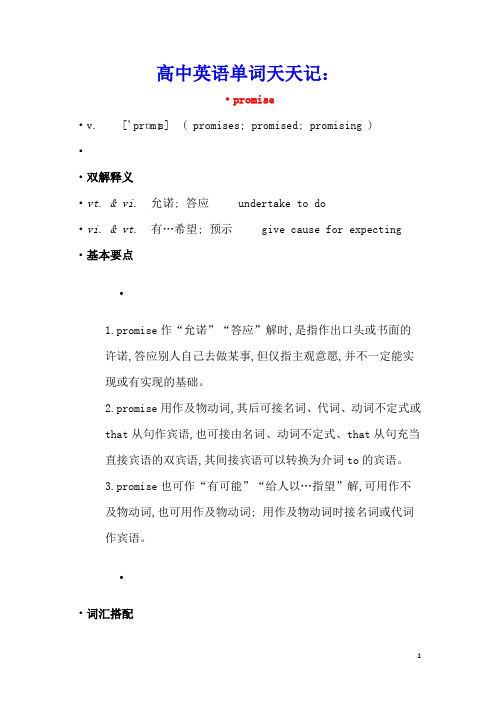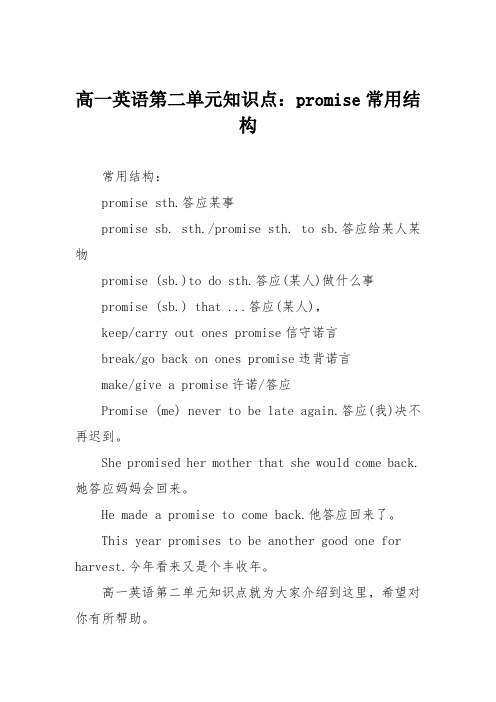人教版高中英语必修3课件 知识点—— “允诺”promise
- 格式:ppt
- 大小:857.00 KB
- 文档页数:9

2019-2020学年高中英语人教版必修三Unit 1III. Language points:1. mean1) mean+ to do打算,意欲2) mean+ n/ pron/that从句---意思3)mean+ v-ing意味meaning (n) 意思meaningful (a) 有意义的2. celebrate (v) celebration (n) 庆祝活动hold a celebration/ celebrations3. take place 不用于被动语态take sb’s place/ take the place of sb= replace sbtake place 指经过安排的事情happen 偶然发生,碰巧发生break out 灾难、疾病、战争等突然爆发4. would+ v 过去常常…5. starve starve for 急需starve to death 饿死6. Some festivals are held to honour the dead, or satisfy the ancestors, who could return either to help or todo harm.1) v 尊敬,给以荣誉2) in honor of 为了纪念A festival is set to honor/ in honor of the hero.Do harm to sb= harm sbDo more harm than good7. in memory of 纪念,悼念…8. arrive (v) arrival (n)The arrival of the plane has been delayed.____ my arrival at school, Mr Li was there.9. gain (n/ v)I gained a lot from my teacher. No pains, no gains.10. gather聚集,集合(vi) 收集(vt)1) A lot of people gathered to see what had happened.2) The student gathered a lot of information about the hero.11. award 奖励reward 回报,报酬He received an award of 1,000 dollars.He was awarded a medal for his excellent work.12. admire admire sb for sthThey admired our garden.I admired him for his success in business.13. look forward to(介词) + n/ v-ingI’m looking forward to his coming.--ward 向着…方向backward 向后forward 向前14. As though/ if 好象15. have fun with sb1. parking lot2. turn up3. keep one’s words4. hold one’s breath5. obvious—it was obvious that…6. set off7. remind ofUnit 2 Healthy eatingIII. 单元知识点(1):1.Wang Peng sat in his empty restaurant feeling very frustrated.feeling very frustrated现在分词在句中作伴随状语eg.She sat on the chair reading a newspaper.(表伴随)Walking in the street, she met her old friend.(表时间)Seeing no body at home , she decided to eat outside.(表原因)The child fell, striking his head against the ground.(表结果)2. His restaurant ought to be full of people.Ought to 1) to show a moral duty 表示一种道义上的责任,应该Eg.She ought to look after her child better.You ought to study hard to get a high mark.2)ought to have done 表示本应该…,而却没有…Eg.You ought to have come yesterday.3.He thought of his mutton kebabs, fatty pork cooked in the hottest, finest oil. 过去分词短语作后置定语,表被动。


高中英语单词天天记:·promise·v.['prɒmɪs] ( promises; promised; promising )··双解释义·vt. & vi.允诺; 答应undertake to do·vi. & vt.有…希望; 预示 give cause for expecting ·基本要点•1.promise作“允诺”“答应”解时,是指作出口头或书面的许诺,答应别人自己去做某事,但仅指主观意愿,并不一定能实现或有实现的基础。
2.promise用作及物动词,其后可接名词、代词、动词不定式或that从句作宾语,也可接由名词、动词不定式、that从句充当直接宾语的双宾语,其间接宾语可以转换为介词to的宾语。
3.promise也可作“有可能”“给人以…指望”解,可用作不及物动词,也可用作及物动词; 用作及物动词时接名词或代词作宾语。
•·词汇搭配••promise a dance (to sb) 答应(与某人)跳舞•promise help 答应帮助•promise oneself sth 指望获得某物,决心弄到某物•promise rain 有希望下雨•promise students a day's holiday 答应放学生一天假•promise the moon 答应办做不到的事•••always promise 总是许诺•never promise 从不许诺•••promise well 显示出成功的迹象,前景很好•promise blandly 平和地允诺•promise blithely 快乐地允诺•promise casually 非正式地允诺•promise cautiously 谨慎地允诺•promise cheerfully 高兴地允诺•promise definitely 肯定地允诺•promise devoutly 真诚地允诺•promise generously 慷慨地允诺•promise faithfully 忠诚地允诺•promise flatteringly 奉承地允诺•promise frankly 真诚地允诺•promise freely 随意地允诺•promise graciously 有礼貌地允诺•promise lightly 轻率地允诺•promise optimistically 乐观地允诺•promise publicly 公开允诺•promise recklessly 轻率地允诺•promise reluctantly 不情愿地允诺•promise solemnly 庄严地允诺•promise treacherously 不可靠地允诺•promise unconditionally 无条件地允诺•promise unquestionably 毫无疑问地允诺•promise unwillingly 勉强地允诺•promise usually 经常允诺•promise vehemently 强烈地允诺•promise away 答应送掉•••promise on sb's honour 以名誉保证,与…订婚•promise to 答应与…做某事•·常用短语•promise away(v.+adv.)答应送掉 give away by promising▲promise sth⇔away to sbHe has promised most of his books away to his friends.他已答应把他大部分书籍送给他的朋友们。

高一英语第二单元知识点:promise常用结
构
常用结构:
promise sth.答应某事
promise sb. sth./promise sth. to sb.答应给某人某物
promise (sb.)to do sth.答应(某人)做什么事
promise (sb.) that ...答应(某人),
keep/carry out ones promise信守诺言
break/go back on ones promise违背诺言
make/give a promise许诺/答应
Promise (me) never to be late again.答应(我)决不再迟到。
She promised her mother that she would come back.她答应妈妈会回来。
He made a promise to come back.他答应回来了。
This year promises to be another good one for harvest.今年看来又是个丰收年。
高一英语第二单元知识点就为大家介绍到这里,希望对你有所帮助。
高一英语必修2知识点:The Olympic Games 高一必修二英语第一单元知识点总结。


高中英语必修三第三单元知识点总结第三单元)betmakeabet打赌place/putabeton在……下赌注one’sbestbet最好的办法作动词,表示“打赌,赌博”,后直接加宾语。
Ibet(that)表示“我敢肯定”,相当于Iamsure。
youbet表示“肯定,没问题”,相当于certainly。
2)scenescene表示“(戏剧,电影中的)一幕/一场,出事地点,现场,情景;风景,布景”。
behindthescenes在幕后;秘密地。
onthescene在现场。
setthescene(forsth)作事前的现场描述,为……做准备。
comeonthescene到现场。
3)stage表示“舞台,戏剧,阶段”,可以表示“路程,一段路,(事故发生的)现场”。
be/goonthestage当演员,登台演出setthestageforsth为某事做准备。
4)tale是可数名词,表示“传说,故事”。
tellitsowntale不言自喻,显而易见。
5)permit作动词,后接名词或者代词,表示“允许,答应”;也可以表示“使可能”。
后接不定式的复合结构。
后接动名词,不能直接跟不定式。
分词短语作状语。
后不能跟从句。
permitofsth认可,容忍。
作名词,表示“许可证,执照,许可”。
6)account作名词,表示“叙述,报道,理由,账目,户头”。
by/fromallaccounts根据大家所说的。
giveanaccountof叙述,报道,说明。
作名词,表示“认为”时,后接复合宾语。
accountfor表示“做出解释,导致,是……的原因”,还可以表示“占,捕获”。
常见的词组:outofaccount不考虑onallaccounts/oneveryaccount 无论如何onnoaccount决不take…intoaccount/takeaccountof…对……加以考虑,顾及……turn…togoodaccount利用7)jealousbejealousofsb嫉妒,唯恐某人被他人夺走。
必修三各单元知识点总结第一单元1)starve作不及物动词,表示“饿死,挨饿”。
starve for=be starve of/for ,表示“渴望获得,迫切得到”。
2)plenty作不可数名词,只用于肯定句中,表示“充足,大量,富裕”,可做主语,宾语或表语。
做主语时,谓语动词随着plenty 所指的单复数形式作相应的变化。
plenty 也可作副词,表示“充分地,十足地,好多”。
in plenty 表示“大量的,丰富,充裕”可作表语,定语,状语。
3)satisfy作及物动词,表示“满意,使满足”从句前有间接宾语。
satisfy, with 以 ,, 满足be satisfied with 对 ,, 满足satisfy, for 向 ,, 偿还be satisfied to do sth 满足于做某事,直接跟宾语,若接that从句时,意思是“使相信”,4)harm作名词,意为“损害” ,不与不定冠词连用,常与 do, come,meando more harm than good 弊大于利There’s no harm in (sb’ s)doing sth=It does no harm for sb to do sth 等动词搭配。
做某事无害处作及物动词,表示“损害,伤害”。
5)lead作及物动词,表示“领导,引导”其宾语常接介词短语或者副词作宾补。
表示“影响,致使”时,后接介词to,也可以接不定式。
lead sb into 使某人陷入某种不良的状态。
lead sb away 使盲从,常用于被动语态。
lead nowhere 毫无结果,,对 ,, 不起作用。
lead up to sth 作为 ,, 准备,导致。
lead sb by the nose 牵着某人的鼻子,完全操纵某人lead a dog’ s life 过困难的生活lead sb believe that 使某人相信(假的事情或不确切的事情)lead the way 带路,带头lead 作为名词, give sb a lead 给某人做出榜样,提示某人6)origin是名词,表示“起源,起因,出身”。
重点词语及短语解析1.permit(1) vi.允许,许可①permit + sb. to do sth.Mary’s father will not permit her to come back late.玛丽的父亲不允许她晚归。
②permit + n. / pron.I don’t permit cats in my kitchen.我不允许猫进入厨房。
③permit + doingWe don’t permit smoking in the bus我们不允许在公共汽车里吸烟。
(2) vi.容许Weather permitting ( = If the weathe permits ), we’ll go camping.如果天气允许的话,我们就去露营。
(3) n.执照,许可证词语辨析:permit 和allow的用法①两者都能以名词或动词-ing形式作宾语,以不定式作宾补。
通常可以互换。
如:We do not permit (allow) smoking in the office.我们不允许在办公室里吸烟。
Mother wouldn’t permit (allow) her little daughter to go out at night.妈妈不允许她的小女儿晚上出去。
②permit 表示“允许,许可”时语气较强,有赋予权利之意,常用于法律、规章、制度等方面。
allow是常用语,一般指听任或默认某人去做某事,仅仅表示不想妨碍之意。
如:The law permits the sale of such drugs.法律允许出售这种药。
We can’t stand by and allow such a thing.对这样的事我们不能袖手旁观。
allow 可用来表示客气的请求。
如:Will you please allow me to use your pen?我可以用你的钢笔吗?2.mind表示“介意;反对”时,常用于下列结构:(1)mind (sb./sb.’s) doing something表示“介意或反对某人做某事”。